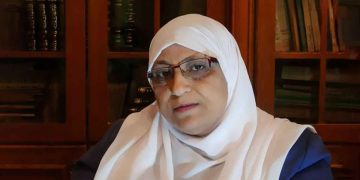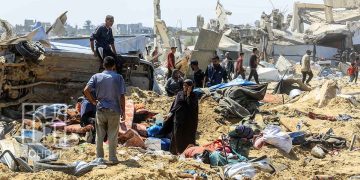On Thursday, 2 January 2025, the Arab Organisation for Human Rights in the UK (AOHR UK) organised a significant webinar addressing the systematic and deliberate targeting of healthcare facilities in Gaza by Israeli authorities. The webinar shed light on the catastrophic consequences of the destruction of Gaza’s healthcare system during the recent war, exposing the grave violations of international humanitarian law and the devastating impact on the lives of Palestinian civilians. Among the critical issues discussed was the detention of healthcare workers, including Dr. Houssam Abu Safiya, a prominent medical professional in Gaza who has been arbitrarily detained by Israeli forces. His detention, along with others, highlights the severe risks faced by medical personnel working under siege and the targeted suppression of healthcare providers in conflict zones.
The webinar featured an esteemed panel of international medical experts and humanitarians who have witnessed the atrocities firsthand, including Dr. Mark Perlmutter, a hand surgeon; Dr. Mohamed Abu Mughaiseb, representing Doctors Without Borders; Dr. James Smith, an emergency doctor; Dr. Junaid Sultan, a vascular surgeon; Dr. Yasser Khan, an ophthalmic surgeon; and Dr. Dorotea Gucciard, Director of Development for Glia Humanitarian Group.
The webinar also featured Dr. Tlaleng Mofokeng, the UN Special Rapporteur on the Right to Health, who provided critical insights into the intersection of health rights and international humanitarian law in the context of Gaza.
Dr. Mohamed Abu Mughaiseb, representing Doctors Without Borders (MSF), began his contribution by highlighting the long-standing challenges faced by Gaza’s healthcare system, exacerbated by decades of closure and siege. Even before October 7th, the healthcare sector was already in a fragile state, with persistent shortages of medical supplies—50% of essential items often being out of stock—and significant barriers to referring patients abroad for specialized treatment. This fragility was compounded by repeated waves of violence over the years, during which hospitals and primary care facilities were frequently targeted.
Dr. Abu Mughaiseb described how the situation deteriorated dramatically after October 7th. The Israeli aggression included systematic targeting of Gaza’s major hospitals, such as Al-Shifa, the largest hospital in Palestine, which faced evacuation orders, as well as Nasser Hospital in Khan Yunis and hospitals in Rafah. Kamal Edwan Hospital, which served as the main healthcare provider for the northern Gaza region, including Jabalia, Beit Lahia, and Beit Hanoun, was one of the last hospitals to be directly targeted. He condemned the direct attacks on Kamal Edwan Hospital and the arrest of Dr. Houssam Abu Safiya and his team, labeling these acts as part of a broader campaign of ethnic cleansing and forced displacement.
The northern Gaza region, Dr. Abu Mughaiseb explained, has been left without any functioning healthcare infrastructure. Hospitals such as the Indonesian Hospital and Al-Awda Hospital are barely operational, with no accessibility for patients or staff. The absence of medical care, coupled with a blockade preventing the entry of basic necessities like food and water, has created an unimaginable humanitarian crisis. MSF teams, who initially worked in the north, were forced to leave due to the unbearable conditions and their own families’ safety concerns.
In his concluding remarks, Dr. Abu Mughaiseb emphasized the urgent need for protecting healthcare workers and ensuring that medical staff are not made targets in conflicts. He called for the immediate release of all detained medical professionals and urged the international community to push for a sustained ceasefire to allow the resumption of healthcare delivery. Representing MSF, he reiterated the organization’s call for the protection of healthcare systems and the urgent need to end the war to alleviate the suffering of Gaza’s population.
Dr. Junaid Sultan emphasized the catastrophic implications of the attacks on healthcare in Gaza, particularly in the northern region, where civilians remain under constant assault without any access to medical care. He highlighted that hospitals like Al-Ahly and Al-Wafa, which could have provided essential services, were also attacked, resulting in the deaths of seven healthcare workers at Al-Wafa. He underscored how the denial of healthcare to a population constitutes a severe violation of international humanitarian laws and represents a silent yet devastating method of annihilation, comparable to the effects of nuclear warfare.
Dr. Sultan described the systematic targeting of Kamal Adwan Hospital, which served as a critical healthcare provider for northern Gaza. He detailed the relentless siege and eventual destruction of the hospital, along with the arrest of its director Dr. Houssam Abu Safiya. The hospital’s essential facilities, including intensive care units, oxygen tanks, and generators, were deliberately destroyed. Despite Dr. Abu Safiya’s repeated appeals to the international community to save the hospital from destruction, these pleas were ignored. Dr. Sultan described these actions as not only violations of international humanitarian laws but also of the Geneva Conventions and the Rome Statute, emphasizing the urgency of accountability.
He called on global medical associations and international bodies to take practical steps to uphold international humanitarian laws, drawing parallels to the swift actions taken during the conflict in Ukraine. Dr. Sultan condemned the hypocrisy and double standards that have allowed such atrocities in Gaza to continue unchecked, urging for consistent and unequivocal measures in all global conflicts.
In his concluding remarks, Dr. Sultan called for an immediate ceasefire, condemning the complicity of Western governments in supplying weapons to Israel, urging them to cease their support and refrain from enabling war crimes and genocide. He stressed the urgent need for practical measures to protect healthcare workers and facilities, highlighting the inconsistency of global responses to conflicts, particularly the stark contrast to actions taken during the war in Ukraine.
Dr. Sultan further underscored the critical importance of opening humanitarian corridors to supply essential resources to rebuild Gaza’s decimated healthcare infrastructure. He also highlighted the plight of junior medical doctors and students whose futures have been severely impacted by the crisis, urging the international community to support these groups.
He concluded with a powerful message, emphasizing that failure to act decisively not only threatens the lives of those in Gaza but sets a dangerous precedent that could embolden similar atrocities elsewhere. He called for immediate, coordinated action to uphold international humanitarian law and restore the basic rights and dignity of those affected.
Dr. Yasser Khan shared his personal experiences from multiple visits to Gaza, emphasizing the dire state of its healthcare system even before the current war. Reflecting on his time at the European Gaza Hospital in 2023-2024, he recounted how Nasser Hospital was already destroyed, patients abandoned, and the medical infrastructure left in ruins. He described the systematic targeting of healthcare facilities and personnel as a blatant violation of humanitarian principles, international law, and basic human decency.
Dr. Khan highlighted the targeting of Kamal Adwan Hospital, where healthcare workers like Dr. Houssam Abu Safiya were arrested and subjected to inhumane treatment. He called this a direct attack on humanity, noting that healthcare workers are neutral protectors of life and should never be targeted. He reminded the audience that these actions violate Article 18 of the Fourth Geneva Convention, which mandates the protection of medical personnel, and constitute war crimes under international law.
He stressed the catastrophic consequences of these attacks, which have pushed Gaza’s healthcare system beyond collapse, resulting in thousands of preventable deaths. Dr. Khan referenced recent estimates indicating that over 300,000 people have died due to the combined effects of war, deprivation, and the lack of medical care, with the wounded facing a death sentence in the absence of functional healthcare.
Dr. Khan condemned the failure to protect healthcare workers as an ethical and legal failure, warning that it undermines global norms and invites further violations of humanitarian principles. He also highlighted the long-term psychological and societal scars that will ripple through generations, leaving Gaza dependent on international aid for decades.
In his concluding remarks, Dr. Khan outlined urgent steps to address the crisis. He called for the immediate release of all detained healthcare professionals, including Dr. Houssam, and an end to attacks on clinics and hospitals. He emphasized the need to uphold humanitarian law, enforce the Geneva Conventions, and secure a ceasefire to stop the genocide. Additionally, he stressed the importance of planning for the future by rebuilding Gaza’s healthcare system, from infrastructure to training medical students. He concluded by celebrating the heroism of individuals like Dr. Houssam, urging the international community to rally around their plight as a tangible and urgent call to action.
Dr. Mark Perlmutter shared his personal experience working at the European Gaza Hospital, recounting the severe challenges faced by healthcare workers and patients during the war. He highlighted the systematic targeting of healthcare professionals, including the use of illegal tungsten flechettes and high-velocity sniper rifles that caused devastating injuries. Dr. Perlmutter described how these weapons were delivered in cluster bombs, leaving minimal external wounds but inflicting catastrophic internal damage. He provided vivid accounts of treating nurses and other medical personnel who sustained life-altering injuries, emphasizing the deliberate targeting of healthcare workers as a war crime.
One story stood out for Dr. Perlmutter: the case of Tamir, an operating room nurse who was shot in the knee by an Israeli soldier while refusing to abandon a patient under anesthesia. The attack shattered his leg, leading to 45 days of detention, torture, and starvation in an Israeli prison. Upon release, Tamir was left severely injured, blind in one eye, and barely alive. Dr. Perlmutter described the harrowing journey Tamir endured to reach medical care, detailing the extreme suffering and neglect he faced. This case, he argued, epitomizes the systematic violations of international law, including the Geneva Conventions and the Rome Statute.
Dr. Perlmutter also shed light on the dire conditions at the European Gaza Hospital, where he worked with volunteers under severe resource constraints. He described a lack of basic medical supplies, failing equipment, and the overwhelming demand for care as patients were transferred from across Gaza due to the destruction of other hospitals. Despite these challenges, the medical staff continued to provide critical care under impossible circumstances.
In his concluding remarks, Dr. Perlmutter discussed ongoing efforts to address the healthcare crisis in Gaza. He highlighted meetings with U.S. congressmen and other policymakers to advocate for the protection of healthcare workers and the cessation of their detention and torture. He also spoke of initiatives to support Palestinian medical students through international placement programs, emphasizing the need for funding to ensure the continuation of medical education and the rebuilding of Gaza’s healthcare system. Dr. Perlmutter called for immediate global action to stop the targeting of healthcare workers and infrastructure, emphasizing that the humanitarian crisis in Gaza demands urgent and sustained international attention.
Dr. James Smith delivered a powerful speech grounded in the findings of the most recent OHCHR report on the systematic targeting of Gaza’s healthcare infrastructure and personnel. He described a pattern of attacks on hospitals and healthcare facilities that began in October 2023 and continues unabated. These attacks included missile strikes, sieges, and the destruction of vital infrastructure. Dr. Smith highlighted that the systematic destruction of the health system in Gaza is part of a broader strategy of genocide and ethnic cleansing, with healthcare workers being 3.5 times more likely to be killed than civilians in other professions. This stark statistic underscores the deliberate targeting of medical personnel.
Drawing from his own observations and broader analyses, Dr. Smith emphasized that the health system in Gaza had been fragile even before October 2023 due to years of blockade and occupation. However, the complete collapse of the healthcare system announced in late 2023 marked the culmination of systematic attacks aimed at denying Palestinians access to essential medical care. He argued that this strategy amplifies the direct effects of military violence by depriving people of basic necessities such as food, water, and shelter, effectively forcing mass displacement under conditions that make survival impossible.
Dr. Smith criticized the global response, noting that the framing of the situation in Gaza as armed conflict rather than genocide has led to inadequate measures to address the crisis. He called for a fundamental shift in the narrative, asserting that the attacks on Gaza occur under the guise of international humanitarian law. According to Dr. Smith, this system is not merely failing but functioning in a way that facilitates the ongoing genocide. He stressed the need to rethink the language and strategies used to advocate for the Palestinian people, moving beyond calls for adherence to international law, which he described as complicit in enabling these atrocities.
In his concluding remarks, Dr. Smith issued an urgent call for the immediate release of Dr. Hossam Abu Safiya and other detained healthcare workers. Having met Dr. Hossam during his visit to Gaza in May, Dr. Smith praised his dedication to saving lives under dire circumstances. He condemned the illegal detention and reported abuse of Dr. Hossam and his colleagues, describing it as a disgraceful violation of human rights and international law. Dr. Smith demanded immediate access for the ICRC and other organizations to detention facilities and stressed the importance of providing released detainees with medical care and safety. He concluded by urging sustained global efforts to end Israel’s aggression in Gaza, including the ongoing siege and occupation, to restore dignity and protection to the Palestinian people.
Dr. Dorotea Gucciardo delivered a poignant and forceful address, highlighting the catastrophic scale of human suffering in Gaza and the deliberate destruction of its healthcare system, including Kamal Adwan Hospital. She likened the current atrocities to the genocide in Rwanda, underscoring the appalling and systematic nature of the violence. Dr. Gucciardo condemned the long-standing narrative employed by Israeli authorities to justify attacks on healthcare facilities, labeling it as baseless, deceptive, and racist.
She exposed Israel’s repeated claims that hospitals like Kamal Adwan are being misused for military purposes, emphasizing that such accusations have consistently been disproved by numerous investigations, including reports by the UN and international human rights organizations. She detailed how, over the years, these allegations have served as preemptive justifications for war crimes, shifting blame onto Palestinians for Israel’s violations of international law.
Dr. Gucciardo described the devastating toll on Gaza’s healthcare system, citing data showing that 33 out of 36 hospitals have been damaged or destroyed, and only 17 remain partially functional. Over 1,000 healthcare workers have been killed, and 450, including Dr. Hossam Abu Safiya, have been detained. She described Dr. Hossam’s detention and disappearance as emblematic of the systematic effort to silence those defending Palestinian rights, calling it an egregious war crime.
She also painted a harrowing picture of the destruction of Gaza’s primary healthcare system, which once provided essential medical services to millions of residents annually. Today, less than 20% of primary healthcare centers remain operational, many of them severely damaged and unable to meet even basic healthcare needs. The systematic dismantling of this infrastructure, combined with the targeting of healthcare workers, has left Gaza’s population without access to medical care, compounding their suffering.
In her conclusion, Dr. Gucciardo issued a powerful call to the international community. She demanded immediate and concrete actions, including a ceasefire, an arms embargo on Israel, and an end to diplomatic and military support for Israeli policies. She emphasized the urgent need for unrestricted humanitarian aid to rebuild Gaza’s healthcare system and called for the immediate release of Dr. Hossam and all detained healthcare workers. Finally, she urged the international community to recognize the Palestinian people’s inherent rights to live free from violence, apartheid, and occupation, stressing that global inaction perpetuates the suffering and injustice inflicted on Gaza.
Dr. Tlaleng Mofokeng began her address by emphasizing the ongoing genocide in Gaza as a culmination of decades-long systemic and sustained imperialist violence. Highlighting the unimaginable atrocities unfolding over the past 450 days, she described the destruction of Gaza’s healthcare infrastructure as part of Israel’s deliberate strategy to deprive Palestinians of basic human dignity and life itself.
Dr. Mofokeng expressed grave concern over the targeted attacks on Gaza’s healthcare system, recounting how over 1,000 healthcare workers, including nurses, paramedics, and doctors, have been killed since October 2023. She condemned the widespread harassment, detention, and torture of medical personnel, including the arrest and disappearance of Dr. Hossam Abu Safiya and more than 128 other detained healthcare workers. She referred to these actions as clear violations of international humanitarian law and human rights, underscoring the failure of the global community, including the United Nations Security Council, to intervene decisively.
Drawing from her mandate as UN Special Rapporteur, Dr. Mofokeng reaffirmed that the Palestinian territories are under illegal occupation, obligating Israel to protect the right to life and health of all individuals. Instead, she said, Israel, supported by billions in aid and weapons from Western allies, has displayed an unrepentant disregard for these obligations, perpetuating genocide with impunity.
In her conclusion, Dr. Mofokeng called for immediate global action to prevent further atrocities. She demanded compliance with International Court of Justice rulings, the immediate cessation of the genocide, and the release of all detained healthcare workers, including Dr. Hossam. She also urged states to prioritize the restoration of Palestinian dignity in all ceasefire negotiations and called for the establishment of independent investigations to hold perpetrators accountable.
Dr. Mofokeng vowed to continue advocating for justice and accountability in her upcoming addresses to the Human Rights Council and the UN General Assembly. She paid tribute to the heroic efforts of Palestinian healthcare workers, describing them as defenders of humanity who uphold the medical oath under the most depraved conditions. Concluding her address, she stressed that genocide is incompatible with the right to health and demanded an immediate ceasefire and an end to the occupation and systemic violence against Palestinians.


























